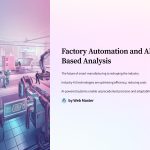 With the rise of Industry 4.0, factory automation combined with AI-based analysis is reshaping the manufacturing sector. Companies are leveraging intelligent automation to optimize production efficiency, reduce operational costs, and enhance decision-making processes. This transformation is driven by AI-powered predictive maintenance, real-time monitoring, and advanced robotics, enabling factories to operate with unprecedented precision and adaptability. As AI continues to evolve, businesses must embrace these technologies to stay competitive in an increasingly automated world.
With the rise of Industry 4.0, factory automation combined with AI-based analysis is reshaping the manufacturing sector. Companies are leveraging intelligent automation to optimize production efficiency, reduce operational costs, and enhance decision-making processes. This transformation is driven by AI-powered predictive maintenance, real-time monitoring, and advanced robotics, enabling factories to operate with unprecedented precision and adaptability. As AI continues to evolve, businesses must embrace these technologies to stay competitive in an increasingly automated world.

The Role of AI in Factory Automation
AI is the backbone of modern factory automation, allowing machines to learn, adapt, and make autonomous decisions. Unlike traditional automation, which relies on pre-programmed instructions, AI-driven systems analyze vast amounts of data to identify patterns and optimize workflows. Machine learning algorithms can predict equipment failures before they occur, minimizing downtime and reducing maintenance costs. Additionally, AI-powered vision systems enhance quality control by detecting defects with greater accuracy than human inspectors.
Key Technologies Driving AI-Based Factory Automation
Several technologies are accelerating AI-based factory automation, including:
- Industrial IoT (IIoT): Connected sensors and devices collect real-time data for AI analysis.
- Digital Twins: Virtual replicas of physical systems help manufacturers simulate and optimize processes.
- Autonomous Mobile Robots (AMRs): AI-driven robots improve material handling and logistics.
- Edge AI: On-device AI processing reduces latency and enhances decision-making speed.
- Natural Language Processing (NLP): AI-powered assistants streamline human-machine interactions.
By integrating these technologies, factories can create highly adaptive and self-optimizing production environments.

Benefits of AI in Smart Manufacturing
AI-driven factory automation offers numerous advantages, such as:
- Enhanced Productivity: AI optimizes workflows, reducing production bottlenecks.
- Cost Reduction: Predictive maintenance and energy-efficient automation lower expenses.
- Improved Quality Control: AI-driven inspection ensures consistent product quality.
- Supply Chain Optimization: AI forecasts demand and streamlines inventory management.
- Workplace Safety: Automated systems reduce the risk of workplace accidents.
These benefits are driving widespread adoption of AI across various industries, from automotive to electronics manufacturing.
Challenges in Implementing AI-Based Factory Automation
Despite its advantages, AI adoption in manufacturing faces several challenges:
- High Initial Investment: AI-driven automation requires substantial capital for infrastructure and integration.
- Data Security Concerns: Connected systems are vulnerable to cyber threats.
- Skill Gaps: Employees need upskilling to work alongside AI-powered machines.
- System Complexity: Implementing AI requires expertise in machine learning, robotics, and IoT.
Overcoming these challenges involves strategic planning, workforce training, and robust cybersecurity measures.

Future Trends in AI-Powered Manufacturing
The future of AI-driven factory automation is promising, with emerging trends such as:
- Hyperautomation: AI-driven automation at every stage of production.
- Collaborative Robots (Cobots): AI-powered robots working alongside human workers.
- AI-Optimized Energy Management: Reducing energy consumption through intelligent monitoring.
- 5G-Enabled Smart Factories: Faster data transmission and seamless machine connectivity.
Manufacturers investing in these innovations will gain a competitive edge in the industry.

Conclusion: Embracing AI for a Smarter Future
AI-based factory automation is revolutionizing the way industries operate, offering unparalleled efficiency, cost savings, and precision. While challenges exist, companies that strategically implement AI solutions will reap long-term benefits. As AI continues to advance, the manufacturing sector must embrace this technology to drive innovation and remain competitive in an increasingly automated world.
*Capturing unauthorized images is prohibited*




